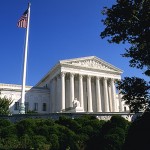Professor Willis Lang and the Teaching of Legal Research
 In recent years, Marquette has won numerous kudos for its program in legal research and writing. Although the current version of the program is still relatively new, the teaching of legal research and writing at Marquette has its roots in the 1920’s.
In recent years, Marquette has won numerous kudos for its program in legal research and writing. Although the current version of the program is still relatively new, the teaching of legal research and writing at Marquette has its roots in the 1920’s.
In summing up the accomplishments of the Law School during the 1923-1924 academic year—the last in the old Mackie Mansion—the Hilltop (the university yearbook) noted: “Prof. Willis E. Lang introduced a new course of Legal Research for the students. It proved a most valuable subject as it teaches where and how to find the law.”
For a number of years prior to 1923, all Marquette Law students had been required to participate in the practice court program, which required them to draft pleadings and legal documents and do a certain amount of legal research. The Law School also required a one-credit course in Legal Bibliography that focused primarily on the use of proper legal citation in brief writing. However, Lang’s Legal Research course was apparently the school’s first attempt at systematic instruction in the mechanics of legal research and the entire canon of library resources.
Willis Lang (pictured above in 1949 or 1950) was a fixture of the Marquette Law School for many years. Born in Waushara County, Wisconsin in 1892, he earned both his bachelor of letters degree and his law degree from Marquette in 1916. Although it was fairly common in the early 1900’s for Marquette students to earn both the Bachelor of Science degree and the M.D. degree at the same commencement, Lang appears to be the only person to have simultaneously received a law degree and any type of bachelor’s degree.
Lang passed the bar in the summer following his graduation and then remained in Milwaukee to practice law. From October 1916 until September 1921, he was in active practice, most of the time while affiliated with William L. Tibbs, special counsel for Milwaukee County. He was also a notary.
Lang joined the Marquette law faculty as a full-time faculty member in the fall of 1921, when Marquette decided to add a fourth full-time member to the faculty. In addition to teaching Corporations, Partnerships, Insurance, Agency, Personal Property, Wills and Administration, and Legal Bibliography, he also taught commercial law in what was then called the School of Economics (i.e., the Marquette business school).
The 1921 appointment of Lang to the law faculty gave him the distinction of being the first graduate of the Marquette Law School to hold a full-time teaching position at the school. Previous full-time professors and deans had received law degrees from the University of Wisconsin (Max Schoetz), Harvard (John McDill Fox), and the University of Chicago (Arthur Richter), or else had been admitted to the bar without attending law school (James Jenkins and Augustus Umbreit).
During his tenure at the Law School, Lang taught a wide variety of courses and held a number of advisory and administrative positions. He served as Law School secretary (a position that no longer exists, but was similar to the modern post of associate dean) from 1923-1951; as Assistant to the Dean from 1928 to 1951; and as Law School Registrar from 1946 to 1951. He was also the faculty adviser to the Law Review from 1928 to 1941, and he regularly represented Marquette at the annual meetings of the Association of American Law Schools.
During his career, Lang published a number of articles on various aspects of Wisconsin law, and he was a regular reviewer of legal treatises written by others. Most of his publications appeared in the Marquette Law Review. He had a longstanding interest in pedagogy, and in the 1930’s, he enrolled as a graduate student in education at Marquette while teaching full-time at the Law School. He was awarded an M.Ed. degree in 1941, his twentieth year on the faculty.
Lang remained on the faculty until his untimely death at age 58 on April 29, 1951. His funeral was held in Gesu Church, and all six of his pallbearers were former students who had become judges. He was survived by his wife and daughter and by his son, Willis Lang, Jr. (1923-1998), who was then a second-year law student and who went on to a long career as a lawyer in southeastern Wisconsin. His Marquette colleagues at the time of his death included current Prof. Emeritus Jim Gihardi who joined the law faculty in 1946. As a law student at Marquette from 1939 to 1942, Prof. Gihardi was also one of Lang’s students.


